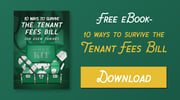We might be moving into summer but for the lettings industry (and the Game of Thrones fans amongst you) winter is coming. While we can’t help you save Winterfell (don’t worry that wasn’t a spoiler) we can help make sure you’re adequately prepared for the Tenant Fee Bill, when it comes into effect on the 1st June 2019. Here are five golden rules to remember to help you beat the fee ban.
1. Know what’s included – As a rule of thumb agents should remember that from 1st June 2019, every fee is illegal unless it’s a Permitted Payment. The following are Permitted Payments:
- Rent,
- A refundable tenancy deposit,
- A refundable holding deposit,
- Default fees for late payment of rent or lost keys,
- Change of contract (such as changing tenants),
- Payment for early termination of a tenancy,
- Council tax, utilities and TV licence (if included in the tenancy),
- Communication services including phone, internet etc (again, if included in the tenancy)
If a payment isn’t on this list, you can’t charge it so make sure you learn the list – or risk being told: “You know nothing, Jon Snow.”
2. Remember existing tenancies don’t come under the ban until 1st June 2020 – You can keep charging fees tied to the original tenancy up until this date – unless the tenancy is renewed in which case it comes under the scope of the ban. Remember any fee taken after 31st May 2020 will be a Prohibited Payment, regardless of the tenancy commencement and you’ll have to return it within 28 days.
3. Change can be a good thing – While the Tenant Fee Bill does place major restrictions on the amount of profit that can be generated from a tenancy, it does throw up new opportunities. Previously legislation around tenants with pets was vague, with many landlords choosing to steer clear altogether and a question mark over whether or not higher deposits could be charged. The Tenant Fee Bill makes clear that landlords cannot charge higher deposits for pet owners but legalises their ability to charge a higher rent (the rent for non pet owners must also be published as a basis for comparison). Although a minor legislative change, this formalisation of a pet owner’s position opens up a new sector in the market.
4. Don’t forget there are plenty of ways to offset the charges – We’ve dealt with ways to offset the ban and increase revenue in other blogs but some of the more popular things to consider include: harnessing technology, offering new services and broadening your reach. Check out our free downloadable E-books for more advice on how to ‘beat the ban’.
5. Don’t underestimate the Tenant Fee Act's severity – Each instance of breaching the ban can be subject to a fine of up to £5,000. Repeated breaches will be face criminal prosecution with an unlimited fine. If an agent is convicted of two offences within a year, he or she may be entered into the Database of Rogue Landlords and Letting Agents, blighting their ability to conduct business forever.
The Tenant Fee Act is set to shake things up in the lettings industry, and there are more changes on their way too. We recently took an in depth look at the upcoming changes including global precedents, read more about the fee ban here.
Our library of free to download ebooks includes details of the changes to Section 21 and the Fitness for Human Habitation bill, as well as more about the tenant fee ban.
 The End of Section 21? What you need to know The End of Section 21? What you need to know |
 The Tenant Fee Bill 2019: Fact sheet The Tenant Fee Bill 2019: Fact sheet |
 How to Survive the Tenant Fee Bill How to Survive the Tenant Fee Bill |
 Future of Lettings: Technology Future of Lettings: Technology |
BLOG DISCLAIMER
This article is intended for information purposes only and does not constitute legal advice. If you have any questions related to issues in this article, we strongly advise contacting a legal professional.
These blog posts are the work of Fixflo and are licensed under a Creative Commons Attribution-ShareAlike 3.0 Unported License. In summary, you are welcome to re-publish any of these blog posts but are asked to attribute Fixflo with an appropriate link to www.fixflo.com. Access to this blog is allowed only subject to the acceptance of these terms.




